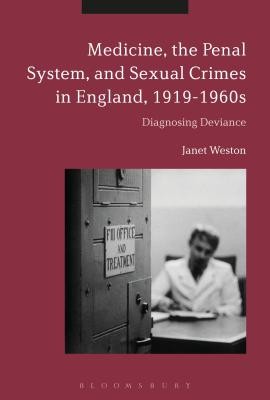
- We will send in 10–14 business days.
- Author: Janet Weston
- Publisher: Bloomsbury Academic
- ISBN-10: 1350021091
- ISBN-13: 9781350021099
- Format: 15.5 x 23.6 x 2.3 cm, hardcover
- Language: English
- SAVE -10% with code: EXTRA
Medicine, the Penal System and Sexual Crimes in England, 1919-1960s (e-book) (used book) | bookbook.eu
Reviews
Description
Sexual crime, past and present, is rarely far from the headlines. How these crimes are punished, policed and understood has changed considerably over the last century. From hormone injections to cognitive behavioural therapy, medical and psychological approaches to sexual offenders have proliferated. This book sets out the history of such theories and treatments in England.
Beginning in the early 20th century, it traces the evolution of medical interest in the mental state of those convicted of sexual crime. As part of a broader interest in individualised responses to crime as a means to rehabilitation, doctors offered new explanations for some sexual crimes, proposed new solutions, and attempted to deliver new cures. From indecent exposure to homosexuality between men, from sadistic violence to thefts of underwear from washing lines, the interpretation and treatment of some sexual offences was thought to be complex. Of less medical interest, though, were offences against children, prostitution, and rape. Using a range of material, including medical and criminological texts, trial proceedings, government reports, newspapers, and autobiographies and memoirs, Janet Weston offers powerful insights into changing medico-legal practices and attitudes towards sex and health. She highlights the importance of prison doctors and rehabilitative programmes within prisons, psychoanalytically-minded private practitioners, and the interactions between medical and legal systems as medical theories were put into practice. She also reveals the extent and legacy of medical thought, as well as the limitations of a medical approach to sexual crime.EXTRA 10 % discount with code: EXTRA
The promotion ends in 18d.17:39:15
The discount code is valid when purchasing from 10 €. Discounts do not stack.
- Author: Janet Weston
- Publisher: Bloomsbury Academic
- ISBN-10: 1350021091
- ISBN-13: 9781350021099
- Format: 15.5 x 23.6 x 2.3 cm, hardcover
- Language: English English
Sexual crime, past and present, is rarely far from the headlines. How these crimes are punished, policed and understood has changed considerably over the last century. From hormone injections to cognitive behavioural therapy, medical and psychological approaches to sexual offenders have proliferated. This book sets out the history of such theories and treatments in England.
Beginning in the early 20th century, it traces the evolution of medical interest in the mental state of those convicted of sexual crime. As part of a broader interest in individualised responses to crime as a means to rehabilitation, doctors offered new explanations for some sexual crimes, proposed new solutions, and attempted to deliver new cures. From indecent exposure to homosexuality between men, from sadistic violence to thefts of underwear from washing lines, the interpretation and treatment of some sexual offences was thought to be complex. Of less medical interest, though, were offences against children, prostitution, and rape. Using a range of material, including medical and criminological texts, trial proceedings, government reports, newspapers, and autobiographies and memoirs, Janet Weston offers powerful insights into changing medico-legal practices and attitudes towards sex and health. She highlights the importance of prison doctors and rehabilitative programmes within prisons, psychoanalytically-minded private practitioners, and the interactions between medical and legal systems as medical theories were put into practice. She also reveals the extent and legacy of medical thought, as well as the limitations of a medical approach to sexual crime.

Reviews